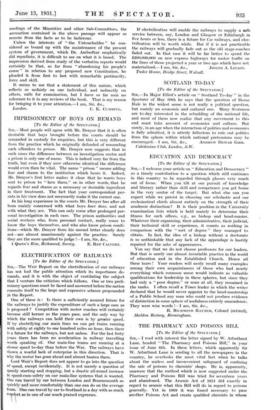IMPRISONMENT OF BOYS ON REMAND
[To the Editor of the SPECTATOR.] SIR,—Most people will agree with Mr. Denyer that it is often desirable that boys brought before the courts should be remanded in custody for enquiries, but this is very different from the practice which he originally defended of remanding such offenders to prison. Mr. Denyer now suggests that in such cases the difference between an investigation centre and a prison is only one of name. This is indeed very far from the truth, but even if they were otherwise identical the difference would even then be vital. The name " prison " means adding fear and shame to the institution which bears it. Indeed, Mr. Denyer's first letter makes it clear that he wants boys sent to prison to " larn them," or, in other words, that he regards fear and shame as a necessary or desirable ingredient in their treatment. The fact that your correspondent per- sists in his view does not necessarily make it the correct one.
In his long experience in the courts Mr. Denyer has after all been mainly concerned with what boys have done, and not with what they are. This can only come after prolonged per- sonal investigation in each case. The prison authorities and social. workers who, from personal contact, really come to know the boys themselves, and who also know prison condi- tions—which Mr. Denyer from his second letter clearly does not—are almost unanimously against the practice. Surely they are the more qualified to judge !—I am, Sir, &c., 1 Queen's Rise, Richmond, Surrey. E. ROY CALVERT.






































 Previous page
Previous page